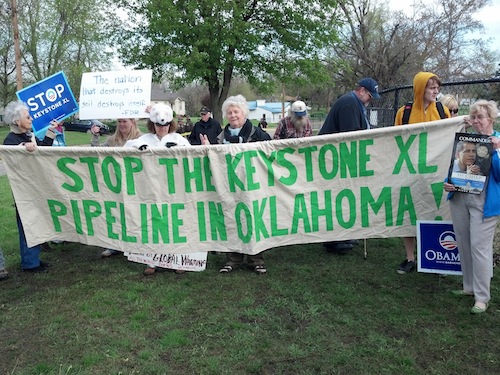This post was written by Justin Hayden, one of the organizers of the event in Cushing. Special thanks to him, and Fannie Bates of Coalition Against Keystone XL Pipeline.

It was cold and they were forced to stand in the mud, in an area that couldn’t have been more than 15 feet across, but on Thursday, March 22nd, a coalition of indigenous, local, and regional activist groups rallied in Cushing, OK to protest President Obama’s visit to support the southern leg of the Keystone XL pipeline.
Groups like the Indigenous Environmental Network, the Center for Energy Matters, Occupy encampments from Tulsa and Wichita, and local activists like Fannie Bates who for years has been fighting the oil giants’ stranglehold on Oklahoma and the legacy of her native ancestors.
While they, those standing against the pipeline, were tucked away on the outskirts of a park along a blocked off road, supporters of the pipeline, bused in from Arkansas by Americans for Prosperity, were given a prime location in town for everyone to see. Just south of them along Main Street was another group of pipeline supporters with equal visibility. When asked about this inequity, the police said, “they were probably on private property and have been given permission to be there by the property owner.” That private property was a public sidewalk, and we all know who really owns the sidewalks at the “pipeline crossroads of the world.”
In the reddest state in the union, experiencing some of the strongest effects of man made climate change, it is not only the climate that has been adversely affected by the business interests of fossil fuel giants, but the very fabric of society. The political ideologies of elected officials, both local and national, are used to create the economic conditions that lead to an impoverished population that is dependent on the oil industry for all things.
Under those conditions, it’s easy to spread lies like the notion that global warming is a hoax or that the Keystone XL pipeline (renamed the “Gulf Coast Project”) might create more than a handful of jobs and not risk irreparable damage to the environment, the aquifers, the atmosphere, and the soil of Native American tribes.
When Fannie rode into town on Tuesday to speak with the authorities in Cushing, they conveniently forgot to mention to her that she’d have to snake through neighborhood side roads to get to her designated “free speech zone,” that a dozen police cars would be parked in some of the only available parking spots, and that she’d have to share her sliver of muddy knoll with paid activists supporting the pipeline. They even threatened her with arrest if she protested anywhere else. Regardless, she and others like her rallied to stand against the continuation of the status-quo.
A status-quo that threatens the very existence of life on our planet.
The moneyed interests at the pipeline crossroads of America may have felt like the victors that day, but when the environment is on the line, there are no winners or losers – only those left dealing with the mess: our children.